
amadeus-python
Python library for the Amadeus Self-Service travel APIs
Stars: 212
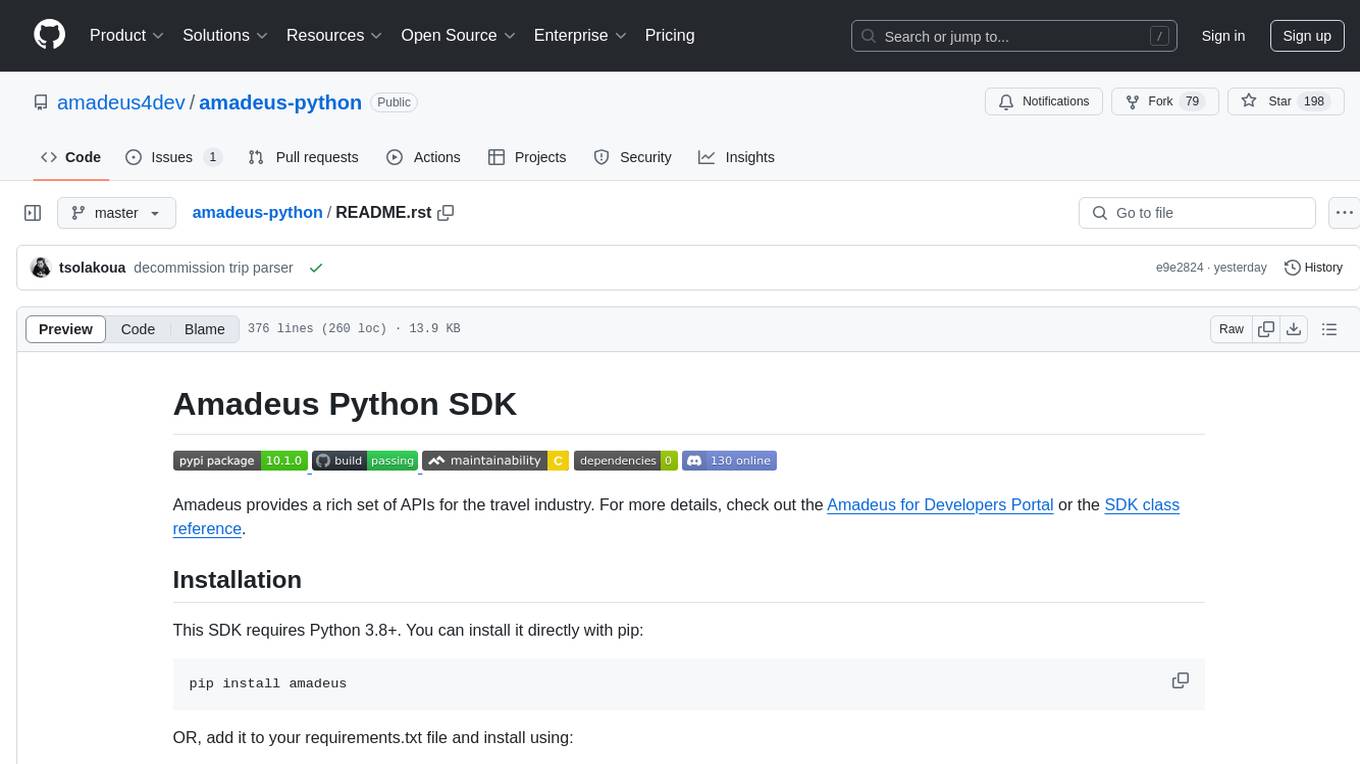
Amadeus Python SDK provides a rich set of APIs for the travel industry. It allows users to make API calls for various travel-related tasks such as flight offers search, hotel bookings, trip purpose prediction, flight delay prediction, airport on-time performance, travel recommendations, and more. The SDK conveniently maps API paths to similar paths, making it easy to interact with the Amadeus APIs. Users can initialize the client with their API key and secret, make API calls, handle responses, and enable logging for debugging purposes. The SDK documentation includes detailed information about each SDK method, arguments, and return types.
README:
|Module Version| |Build Status| |Maintainability| |Dependencies| |Discord|
Amadeus provides a rich set of APIs for the travel industry. For more details, check out the Amadeus for Developers Portal <https://developers.amadeus.com>__ or the SDK class reference <https://amadeus4dev.github.io/amadeus-python>__.
This SDK requires Python 3.8+. You can install it directly with pip:
.. code:: sh
pip install amadeus
OR, add it to your requirements.txt file and install using:
.. code:: sh
pip install -r requirements.txt
To make your first API call, you will need to register <https://developers.amadeus.com/register>__ for an Amadeus Developer Account and set up your first application <https://developers.amadeus.com/my-apps/>__.
.. code:: py
from amadeus import Client, ResponseError
amadeus = Client(
client_id='REPLACE_BY_YOUR_API_KEY',
client_secret='REPLACE_BY_YOUR_API_SECRET'
)
try:
response = amadeus.shopping.flight_offers_search.get(
originLocationCode='MAD',
destinationLocationCode='ATH',
departureDate='2024-11-01',
adults=1)
print(response.data)
except ResponseError as error:
print(error)
You can find all the endpoints in self-contained code examples <https://github.com/amadeus4dev/amadeus-code-examples>_.
The client can be initialized directly.
.. code:: py
# Initialize using parameters
amadeus = Client(client_id='REPLACE_BY_YOUR_API_KEY', client_secret='REPLACE_BY_YOUR_API_SECRET')
Alternatively, it can be initialized without any parameters if the environment variables AMADEUS_CLIENT_ID and AMADEUS_CLIENT_SECRET are present.
.. code:: py
amadeus = Client()
Your credentials can be found on the Amadeus dashboard <https://developers.amadeus.com/my-apps/>__.
By default, the SDK environment is set to test environment. To switch to a production (pay-as-you-go) environment, please switch the hostname as follows:
.. code:: py
amadeus = Client(hostname='production')
Amadeus has a large set of APIs, and our documentation is here to get you started today. Head over to our reference documentation <https://amadeus4dev.github.io/amadeus-python/>__ for in-depth information about every SDK method, as well as its arguments and return types.
-
Initialize the SDK <https://amadeus4dev.github.io/amadeus-python/#/client>__ -
Find an Airport <https://amadeus4dev.github.io/amadeus-python/#amadeus.reference_data.locations.Airports>__ -
Find a Flight <https://amadeus4dev.github.io/amadeus-python/#amadeus.shopping.FlightOffersSearch>__ -
Get Flight Inspiration <https://amadeus4dev.github.io/amadeus-python/#shopping-flights>__
This library conveniently maps every API path to a similar path.
For example, GET /v2/reference-data/urls/checkin-links?airlineCode=BA would be:
.. code:: py
amadeus.reference_data.urls.checkin_links.get(airlineCode='BA')
Similarly, to select a resource by ID, you can pass in the ID to the singular path.
For example, GET /v2/shopping/hotel-offers/XZY would be:
.. code:: py
amadeus.shopping.hotel_offer('XYZ').get()
You can make any arbitrary API call directly with the .get method as well:
.. code:: py
amadeus.get('/v2/reference-data/urls/checkin-links', airlineCode='BA')
Or, with POST method:
.. code:: py
amadeus.post('/v1/shopping/flight-offers/pricing', body)
Every API call returns a Response object. If the API call contained a JSON response it will parse the JSON into the .result attribute. If this data also contains a data key, it will make that available as the .data attribute. The raw body of the response is always available as the .body attribute.
.. code:: py
from amadeus import Location
response = amadeus.reference_data.locations.get(
keyword='LON',
subType=Location.ANY
)
print(response.body) #=> The raw response, as a string
print(response.result) #=> The body parsed as JSON, if the result was parsable
print(response.data) #=> The list of locations, extracted from the JSON
If an API endpoint supports pagination, the other pages are available under the .next, .previous, .last and .first methods.
.. code:: py
from amadeus import Location
response = amadeus.reference_data.locations.get(
keyword='LON',
subType=Location.ANY
)
amadeus.next(response) #=> returns a new response for the next page
If a page is not available, the method will return None.
The SDK makes it easy to add your own logger.
.. code:: py
import logging
logger = logging.getLogger('your_logger')
logger.setLevel(logging.DEBUG)
amadeus = Client(
client_id='REPLACE_BY_YOUR_API_KEY',
client_secret='REPLACE_BY_YOUR_API_SECRET',
logger=logger
)
Additionally, to enable more verbose logging, you can set the appropriate level on your own logger. The easiest way would be to enable debugging via a parameter during initialization, or using the AMADEUS_LOG_LEVEL environment variable.
.. code:: py
amadeus = Client(
client_id='REPLACE_BY_YOUR_API_KEY',
client_secret='REPLACE_BY_YOUR_API_SECRET',
log_level='debug'
)
.. code:: py
# Flight Inspiration Search
amadeus.shopping.flight_destinations.get(origin='MAD')
# Flight Cheapest Date Search
amadeus.shopping.flight_dates.get(origin='MAD', destination='MUC')
# Flight Offers Search GET
amadeus.shopping.flight_offers_search.get(originLocationCode='SYD', destinationLocationCode='BKK', departureDate='2022-11-01', adults=1)
# Flight Offers Search POST
amadeus.shopping.flight_offers_search.post(body)
# Flight Offers Price
flights = amadeus.shopping.flight_offers_search.get(originLocationCode='SYD', destinationLocationCode='BKK', departureDate='2022-11-01', adults=1).data
amadeus.shopping.flight_offers.pricing.post(flights[0])
amadeus.shopping.flight_offers.pricing.post(flights[0:2], include='credit-card-fees,other-services')
# Flight Create Orders
amadeus.booking.flight_orders.post(flights[0], traveler)
# Flight Order Management
# The flight ID comes from the Flight Create Orders (in test environment it's temporary)
# Retrieve the order based on it's ID
flight_booking = amadeus.booking.flight_orders.post(body).data
amadeus.booking.flight_order(flight_booking['id']).get()
# Delete the order based on it's ID
amadeus.booking.flight_order(flight_booking['id']).delete()
# Flight SeatMap Display GET
amadeus.shopping.seatmaps.get(**{"flight-orderId": "orderid"})
# Flight SeatMap Display POST
amadeus.shopping.seatmaps.post(body)
# Flight Availabilities POST
amadeus.shopping.availability.flight_availabilities.post(body)
# Branded Fares Upsell
amadeus.shopping.flight_offers.upselling.post(body)
# Flight Choice Prediction
body = amadeus.shopping.flight_offers_search.get(
originLocationCode='MAD',
destinationLocationCode='NYC',
departureDate='2022-11-01',
adults=1).result
amadeus.shopping.flight_offers.prediction.post(body)
# Flight Checkin Links
amadeus.reference_data.urls.checkin_links.get(airlineCode='BA')
# Airline Code Lookup
amadeus.reference_data.airlines.get(airlineCodes='U2')
# Airport and City Search (autocomplete)
# Find all the cities and airports starting by 'LON'
amadeus.reference_data.locations.get(keyword='LON', subType=Location.ANY)
# Get a specific city or airport based on its id
amadeus.reference_data.location('ALHR').get()
# City Search
amadeus.reference_data.locations.cities.get(keyword='PAR')
# Airport Nearest Relevant Airport (for London)
amadeus.reference_data.locations.airports.get(longitude=0.1278, latitude=51.5074)
# Flight Most Booked Destinations
amadeus.travel.analytics.air_traffic.booked.get(originCityCode='MAD', period='2017-08')
# Flight Most Traveled Destinations
amadeus.travel.analytics.air_traffic.traveled.get(originCityCode='MAD', period='2017-01')
# Flight Busiest Travel Period
amadeus.travel.analytics.air_traffic.busiest_period.get(cityCode='MAD', period='2017', direction='ARRIVING')
# Hotel Search v3
# Get list of available offers by hotel ids
amadeus.shopping.hotel_offers_search.get(hotelIds='RTPAR001', adults='2')
# Check conditions of a specific offer
amadeus.shopping.hotel_offer_search('XXX').get()
# Hotel List
# Get list of hotels by hotel id
amadeus.reference_data.locations.hotels.by_hotels.get(hotelIds='ADPAR001')
# Get list of hotels by city code
amadeus.reference_data.locations.hotels.by_city.get(cityCode='PAR')
# Get list of hotels by a geocode
amadeus.reference_data.locations.hotels.by_geocode.get(longitude=2.160873,latitude=41.397158)
# Hotel Name Autocomplete
amadeus.reference_data.locations.hotel.get(keyword='PARI', subType=[Hotel.HOTEL_GDS, Hotel.HOTEL_LEISURE])
# Hotel Booking v2
# The offerId comes from the hotel_offer above
amadeus.booking.hotel_orders.post(
guests=guests,
travel_agent=travel_agent,
room_associations=room_associations,
payment=payment)
# Hotel Booking v1
# The offerId comes from the hotel_offer above
amadeus.booking.hotel_bookings.post(offerId, guests, payments)
# Hotel Ratings
# What travelers think about this hotel?
amadeus.e_reputation.hotel_sentiments.get(hotelIds = 'ADNYCCTB')
# Location Score
amadeus.location.analytics.category_rated_areas.get(latitude=41.397158, longitude=2.160873)
# Trip Purpose Prediction
amadeus.travel.predictions.trip_purpose.get(originLocationCode='ATH', destinationLocationCode='MAD', departureDate='2022-11-01', returnDate='2022-11-08')
# Flight Delay Prediction
amadeus.travel.predictions.flight_delay.get(originLocationCode='NCE', destinationLocationCode='IST', departureDate='2022-08-01', \
departureTime='18:20:00', arrivalDate='2022-08-01', arrivalTime='22:15:00', aircraftCode='321', carrierCode='TK', flightNumber='1816', duration='PT31H10M')
# Airport On-Time Performance
amadeus.airport.predictions.on_time.get(airportCode='JFK', date='2022-11-01')
# Airport Routes
amadeus.airport.direct_destinations.get(departureAirportCode='BLR')
# Travel Recommendations
amadeus.reference_data.recommended_locations.get(cityCodes='PAR', travelerCountryCode='FR')
# Retrieve status of a given flight
amadeus.schedule.flights.get(carrierCode='AZ', flightNumber='319', scheduledDepartureDate='2022-09-13')
# Tours and Activities
# What are the popular activities in Madrid (based a geo location and a radius)
amadeus.shopping.activities.get(latitude=40.41436995, longitude=-3.69170868)
# What are the popular activities in Barcelona? (based on a square)
amadeus.shopping.activities.by_square.get(north=41.397158, west=2.160873,
south=41.394582, east=2.177181)
# Returns a single activity from a given id
amadeus.shopping.activity('4615').get()
# Returns itinerary price metrics
amadeus.analytics.itinerary_price_metrics.get(originIataCode='MAD', destinationIataCode='CDG',
departureDate='2021-03-21')
# Airline Routes
amadeus.airline.destinations.get(airlineCode='BA')
# Transfer Search
amadeus.shopping.transfer_offers.post(body)
# Transfer Booking
amadeus.ordering.transfer_orders.post(body, offerId='1000000000')
# Transfer Management
amadeus.ordering.transfer_order('ABC').transfers.cancellation.post(body, confirmNbr=123)
Want to contribute? Read our Contributors Guide <.github/CONTRIBUTING.md>__ for guidance on installing and
running this code in a development environment.
This library is released under the MIT License <LICENSE>__.
You can find us on StackOverflow <https://stackoverflow.com/questions/tagged/amadeus>__ or join our developer community on Discord <https://discord.gg/cVrFBqx>__.
.. |Module Version| image:: https://badge.fury.io/py/amadeus.svg :target: https://pypi.org/project/amadeus/ .. |Build Status| image:: https://github.com/amadeus4dev/amadeus-python/actions/workflows/build.yml/badge.svg :target: https://github.com/amadeus4dev/amadeus-python/actions/workflows/build.yml .. |Maintainability| image:: https://api.codeclimate.com/v1/badges/c2e19cf9628d6f4aece2/maintainability :target: https://codeclimate.com/github/amadeus4dev/amadeus-python/maintainability .. |Dependencies| image:: https://raw.githubusercontent.com/amadeus4dev/amadeus-python/master/.github/images/dependencies.svg?sanitize=true :target: https://badge.fury.io/py/amadeus .. |Discord| image:: https://img.shields.io/discord/696822960023011329?label=&logo=discord&logoColor=ffffff&color=7389D8&labelColor=6A7EC2 :target: https://discord.gg/cVrFBqx
For Tasks:
Click tags to check more tools for each tasksFor Jobs:
Alternative AI tools for amadeus-python
Similar Open Source Tools

amadeus-python
Amadeus Python SDK provides a rich set of APIs for the travel industry. It allows users to make API calls for various travel-related tasks such as flight offers search, hotel bookings, trip purpose prediction, flight delay prediction, airport on-time performance, travel recommendations, and more. The SDK conveniently maps API paths to similar paths, making it easy to interact with the Amadeus APIs. Users can initialize the client with their API key and secret, make API calls, handle responses, and enable logging for debugging purposes. The SDK documentation includes detailed information about each SDK method, arguments, and return types.
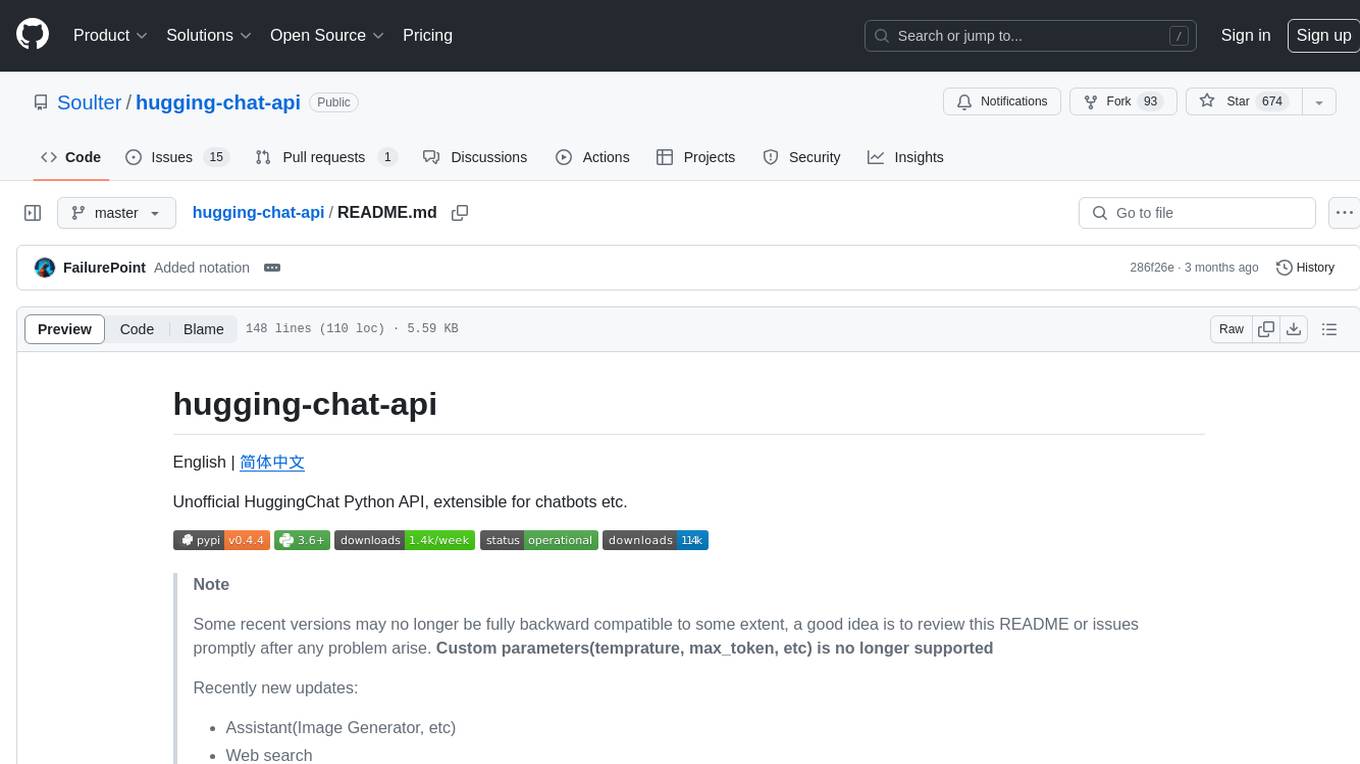
hugging-chat-api
Unofficial HuggingChat Python API for creating chatbots, supporting features like image generation, web search, memorizing context, and changing LLMs. Users can log in, chat with the ChatBot, perform web searches, create new conversations, manage conversations, switch models, get conversation info, use assistants, and delete conversations. The API also includes a CLI mode with various commands for interacting with the tool. Users are advised not to use the application for high-stakes decisions or advice and to avoid high-frequency requests to preserve server resources.
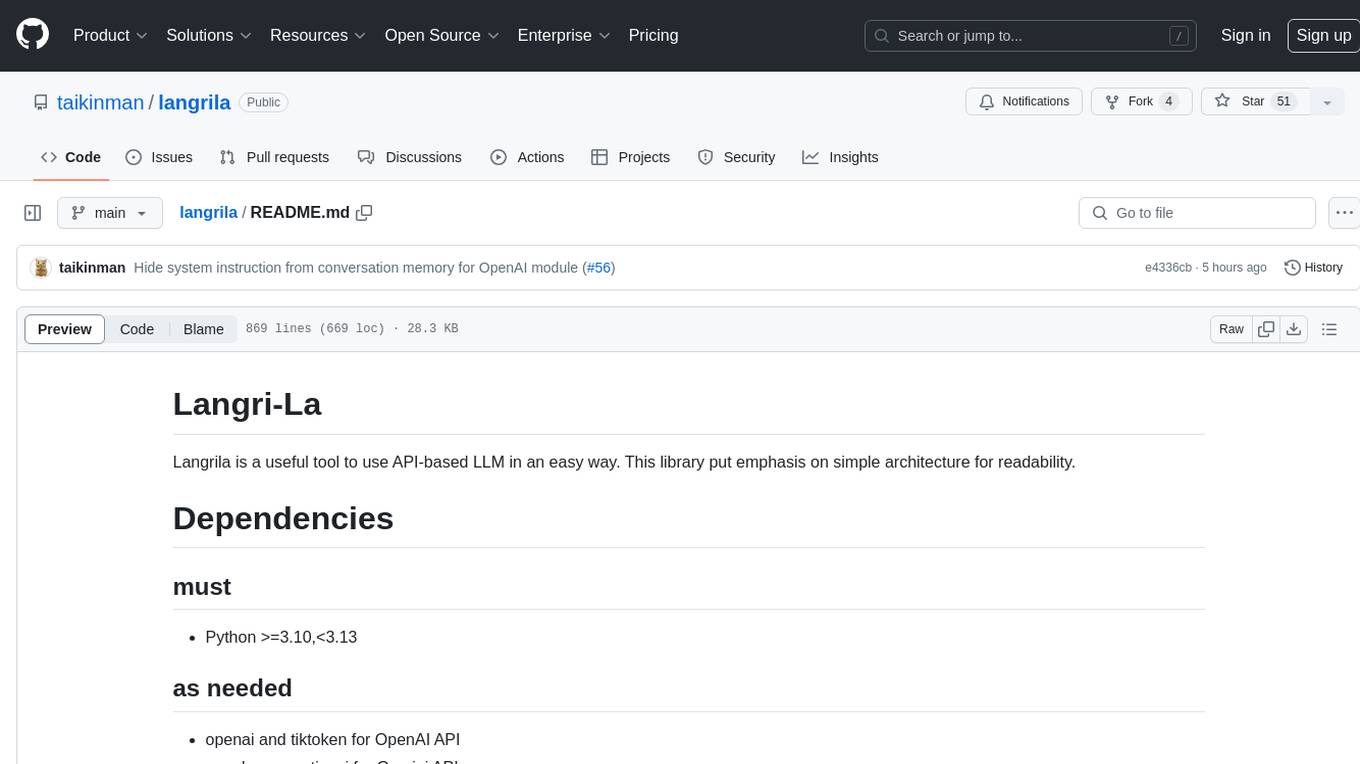
langrila
Langrila is a library that provides an easy way to use API-based LLM (Large Language Models) with an emphasis on simple architecture for readability. It supports various AI models for chat and embedding tasks, as well as retrieval functionalities using Qdrant, Chroma, and Usearch. Langrila also includes modules for function calling, conversation memory management, and prompt templates. It enforces coding policies for simplicity, responsibility independence, and minimum module implementation. The library requires Python version 3.10 to 3.13 and additional dependencies like OpenAI, Gemini, Qdrant, Chroma, and Usearch for specific functionalities.
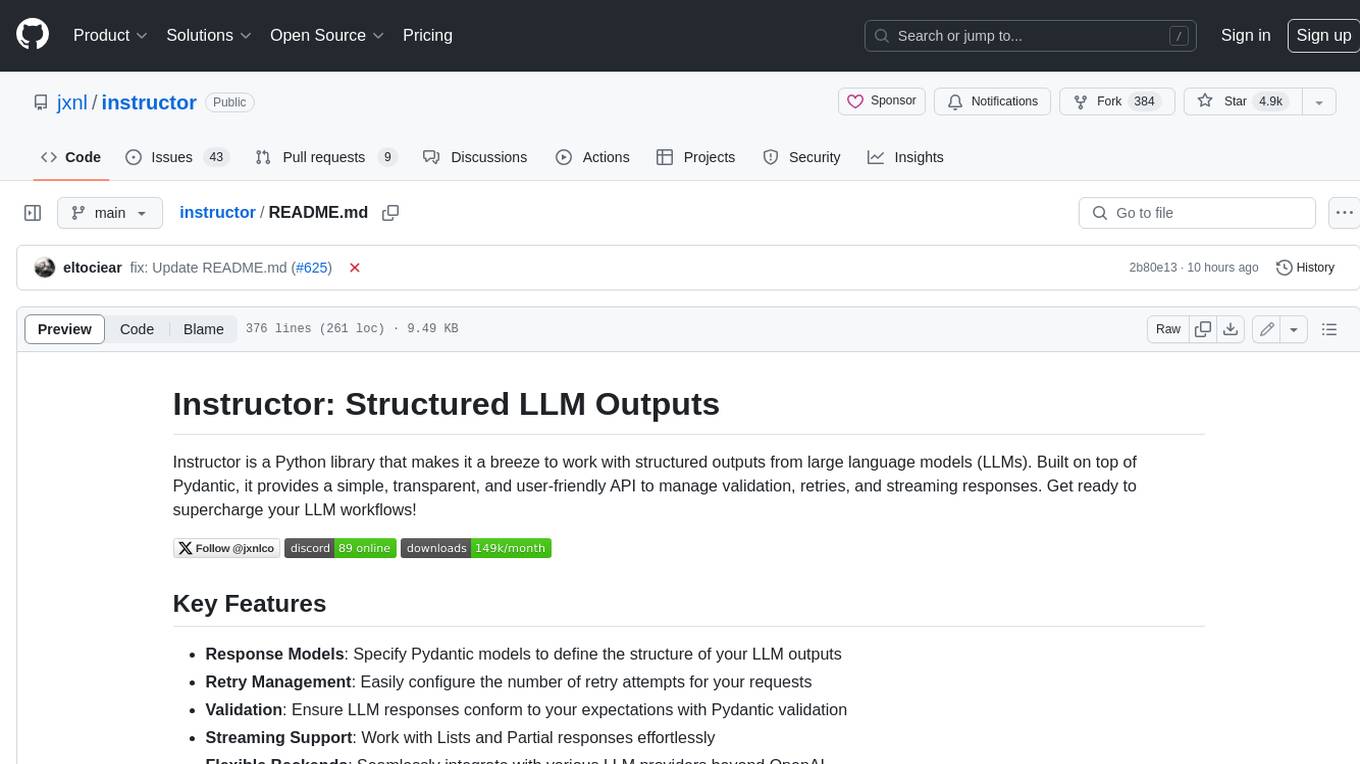
instructor
Instructor is a Python library that makes it a breeze to work with structured outputs from large language models (LLMs). Built on top of Pydantic, it provides a simple, transparent, and user-friendly API to manage validation, retries, and streaming responses. Get ready to supercharge your LLM workflows!
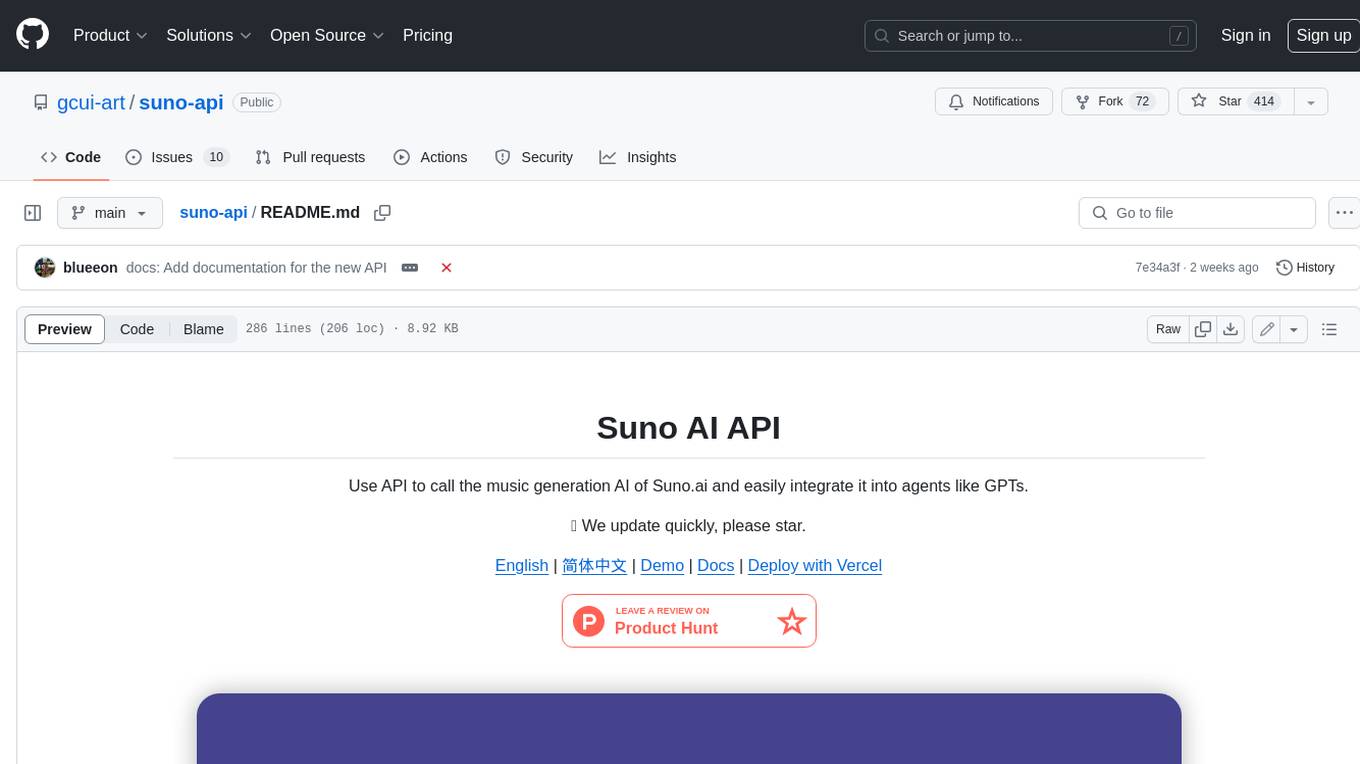
suno-api
Suno AI API is an open-source project that allows developers to integrate the music generation capabilities of Suno.ai into their own applications. The API provides a simple and convenient way to generate music, lyrics, and other audio content using Suno.ai's powerful AI models. With Suno AI API, developers can easily add music generation functionality to their apps, websites, and other projects.
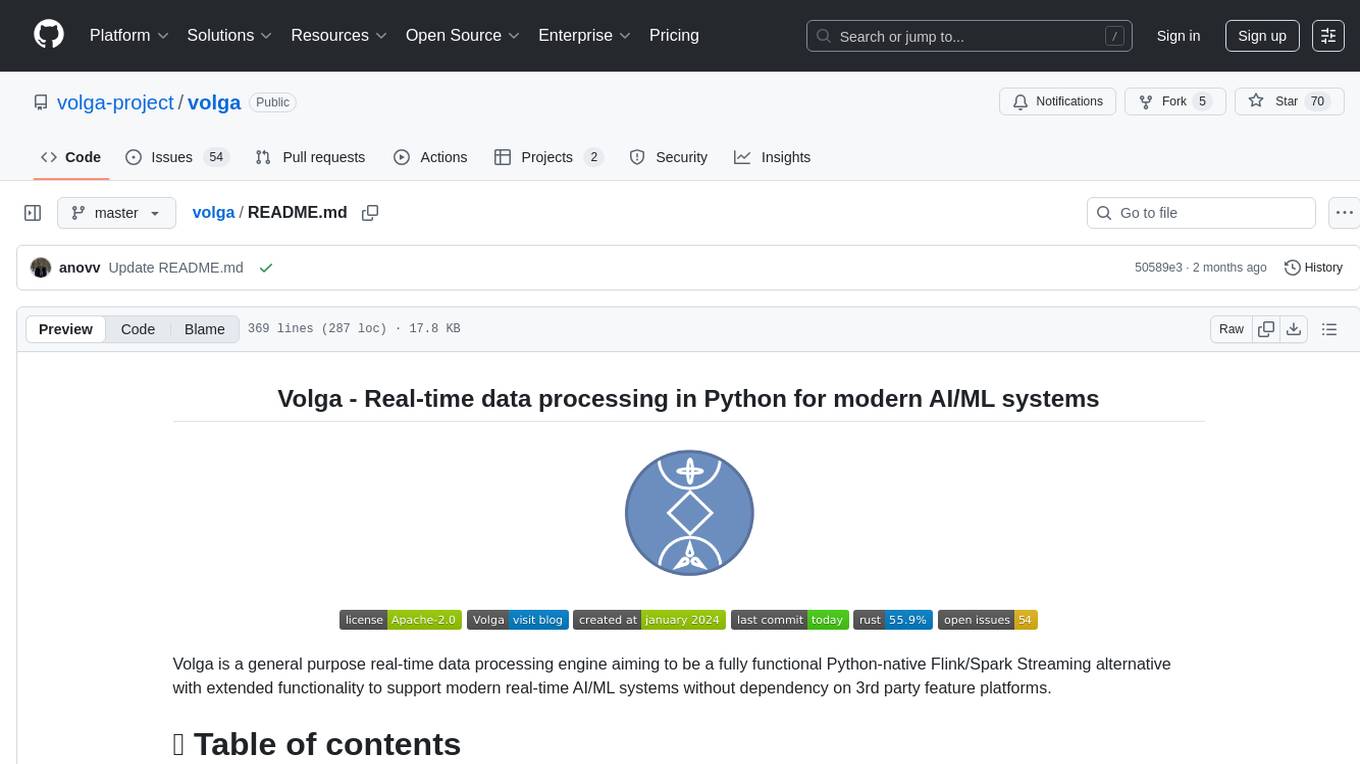
volga
Volga is a general purpose real-time data processing engine in Python for modern AI/ML systems. It aims to be a Python-native alternative to Flink/Spark Streaming with extended functionality for real-time AI/ML workloads. It provides a hybrid push+pull architecture, Entity API for defining data entities and feature pipelines, DataStream API for general data processing, and customizable data connectors. Volga can run on a laptop or a distributed cluster, making it suitable for building custom real-time AI/ML feature platforms or general data pipelines without relying on third-party platforms.
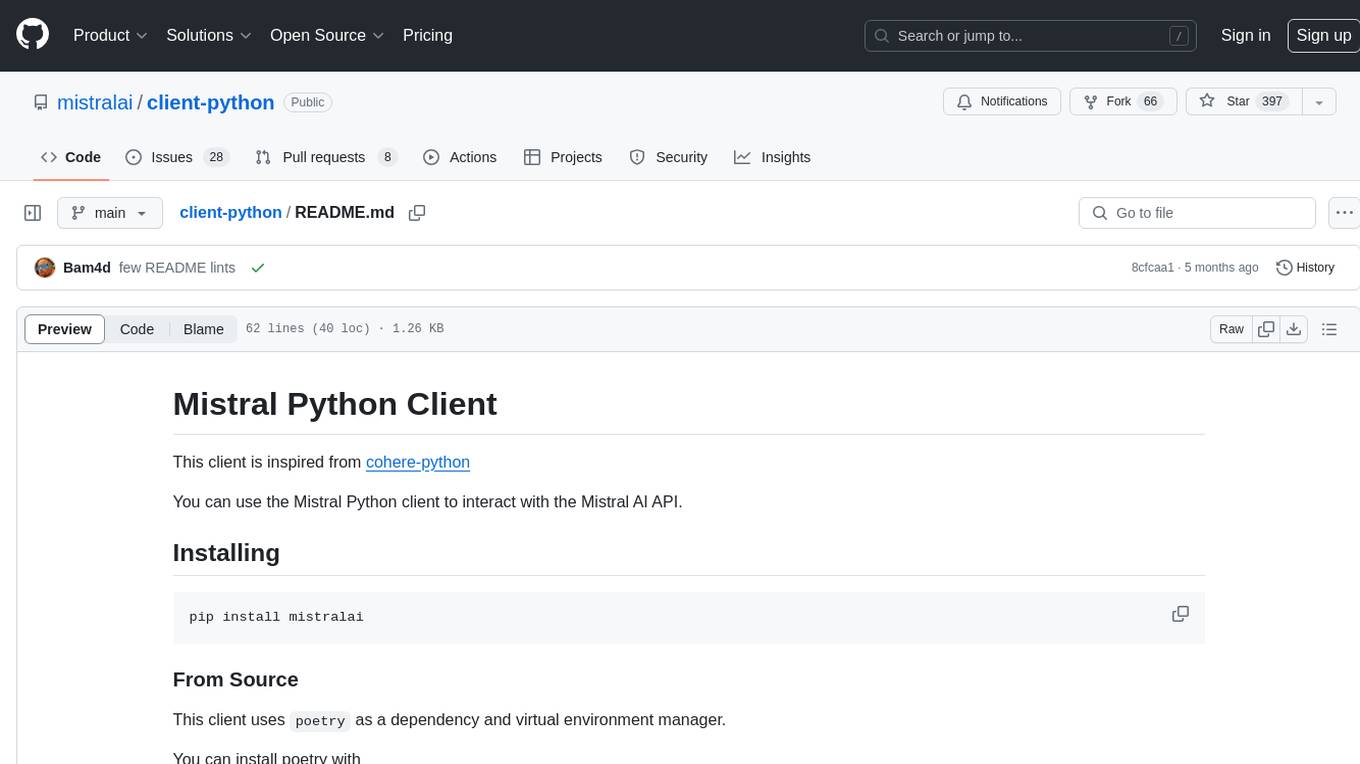
client-python
The Mistral Python Client is a tool inspired by cohere-python that allows users to interact with the Mistral AI API. It provides functionalities to access and utilize the AI capabilities offered by Mistral. Users can easily install the client using pip and manage dependencies using poetry. The client includes examples demonstrating how to use the API for various tasks, such as chat interactions. To get started, users need to obtain a Mistral API Key and set it as an environment variable. Overall, the Mistral Python Client simplifies the integration of Mistral AI services into Python applications.
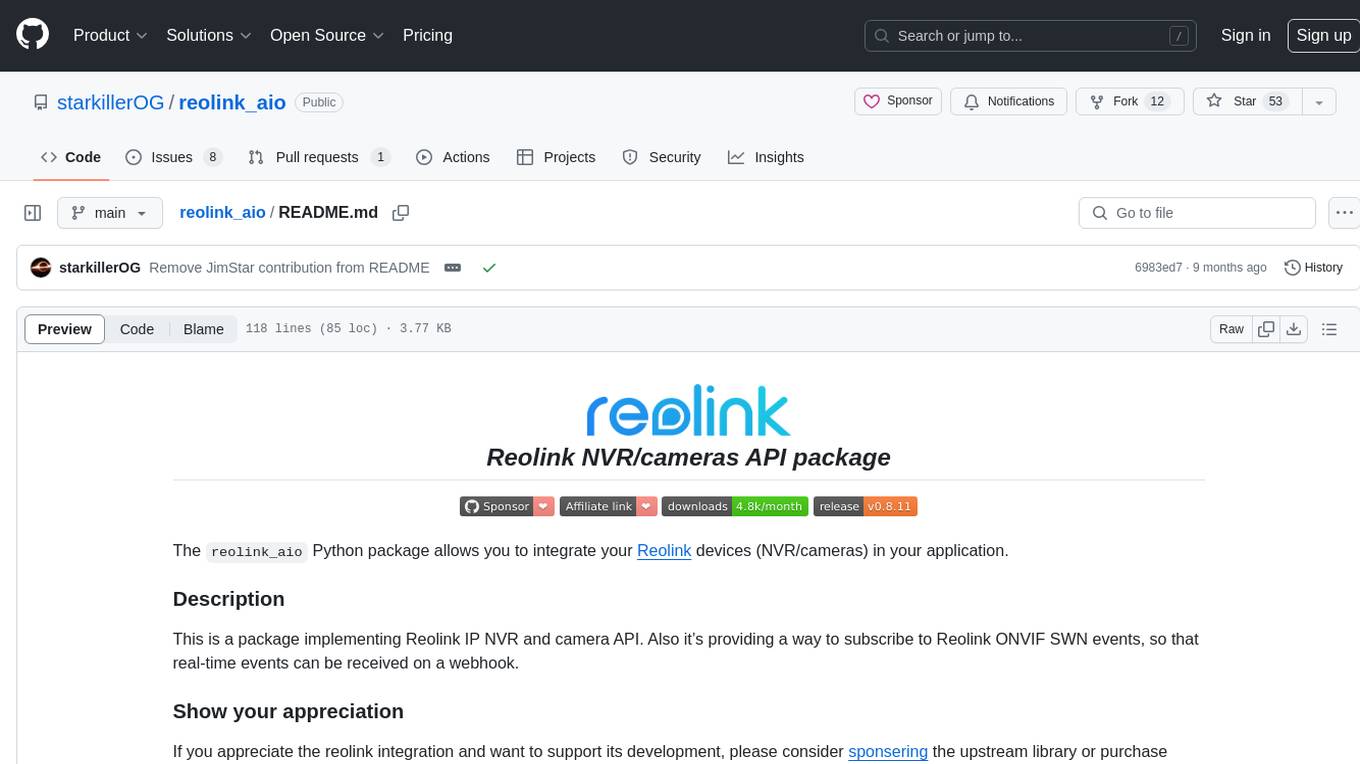
reolink_aio
The 'reolink_aio' Python package is designed to integrate Reolink devices (NVR/cameras) into your application. It implements Reolink IP NVR and camera API, allowing users to subscribe to Reolink ONVIF SWN events for real-time event notifications via webhook. The package provides functionalities to obtain and cache NVR or camera settings, capabilities, and states, as well as enable features like infrared lights, spotlight, and siren. Users can also subscribe to events, renew timers, and disconnect from the host device.
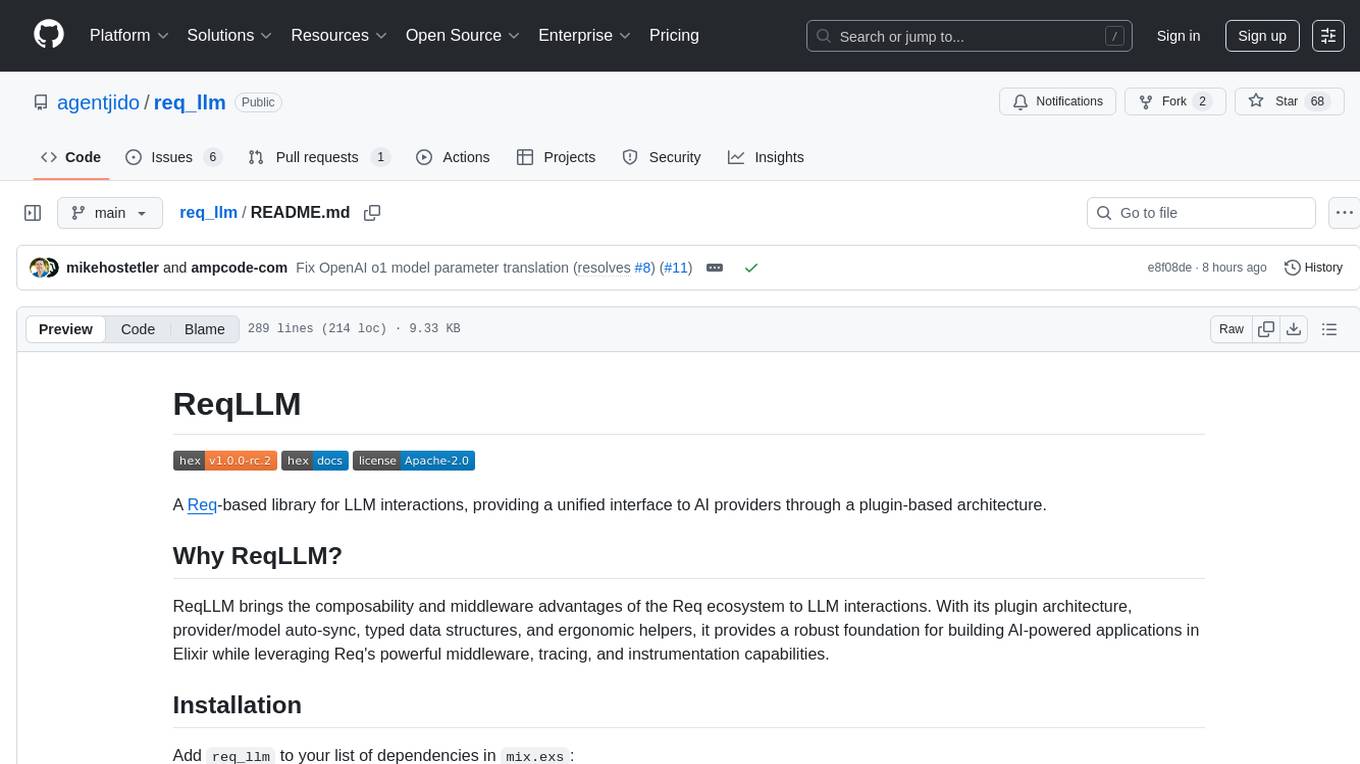
req_llm
ReqLLM is a Req-based library for LLM interactions, offering a unified interface to AI providers through a plugin-based architecture. It brings composability and middleware advantages to LLM interactions, with features like auto-synced providers/models, typed data structures, ergonomic helpers, streaming capabilities, usage & cost extraction, and a plugin-based provider system. Users can easily generate text, structured data, embeddings, and track usage costs. The tool supports various AI providers like Anthropic, OpenAI, Groq, Google, and xAI, and allows for easy addition of new providers. ReqLLM also provides API key management, detailed documentation, and a roadmap for future enhancements.
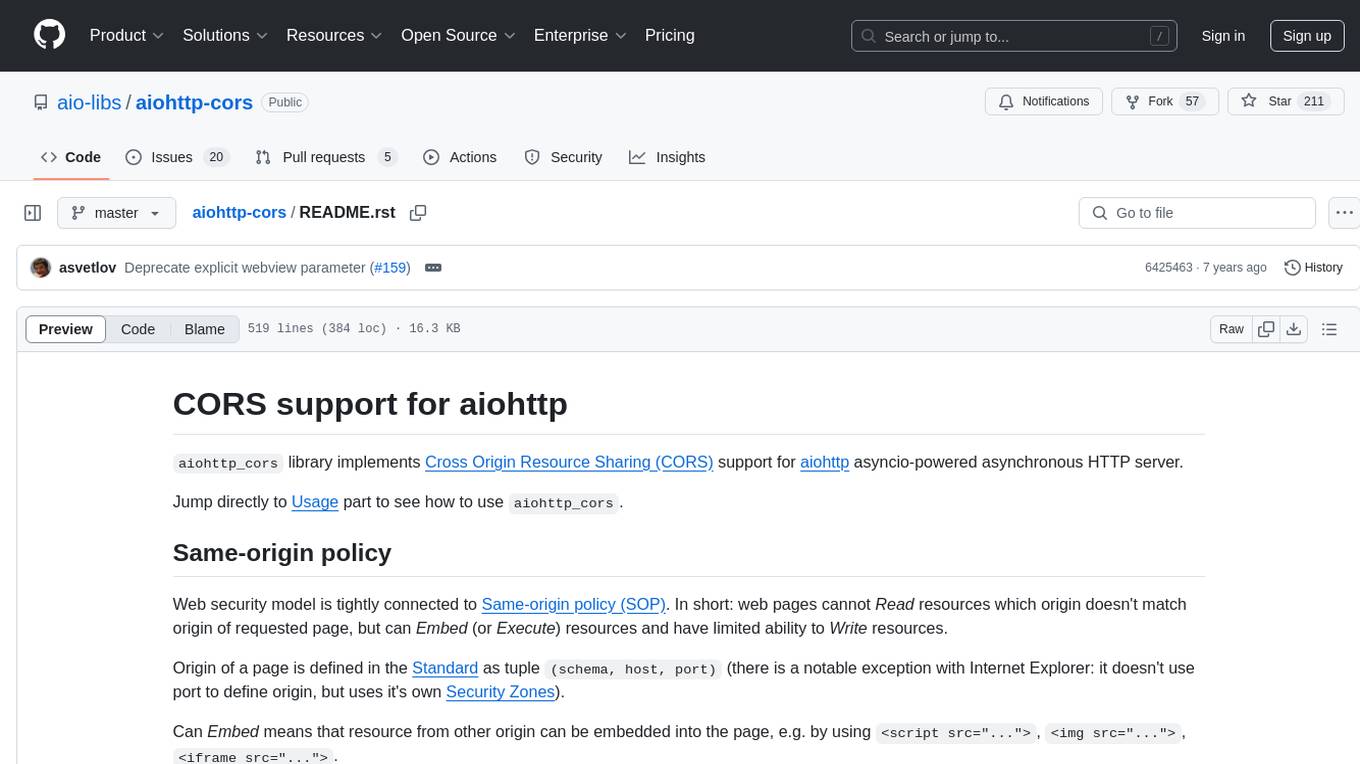
aiohttp-cors
The aiohttp_cors library provides Cross Origin Resource Sharing (CORS) support for aiohttp, an asyncio-powered asynchronous HTTP server. CORS allows overriding the Same-origin policy for specific resources, enabling web pages to access resources from different origins. The library helps configure CORS settings for resources and routes in aiohttp applications, allowing control over origins, credentials passing, headers, and preflight requests.
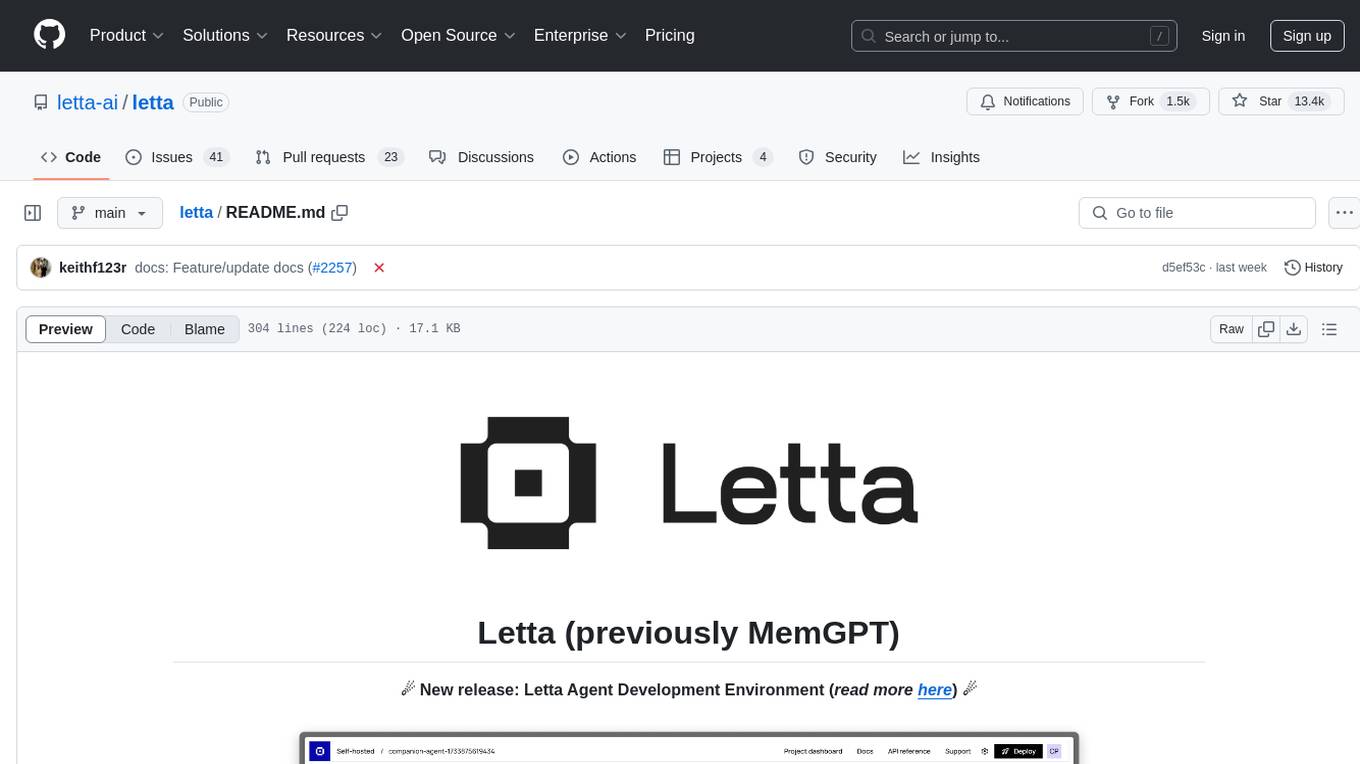
letta
Letta is an open source framework for building stateful LLM applications. It allows users to build stateful agents with advanced reasoning capabilities and transparent long-term memory. The framework is white box and model-agnostic, enabling users to connect to various LLM API backends. Letta provides a graphical interface, the Letta ADE, for creating, deploying, interacting, and observing with agents. Users can access Letta via REST API, Python, Typescript SDKs, and the ADE. Letta supports persistence by storing agent data in a database, with PostgreSQL recommended for data migrations. Users can install Letta using Docker or pip, with Docker defaulting to PostgreSQL and pip defaulting to SQLite. Letta also offers a CLI tool for interacting with agents. The project is open source and welcomes contributions from the community.
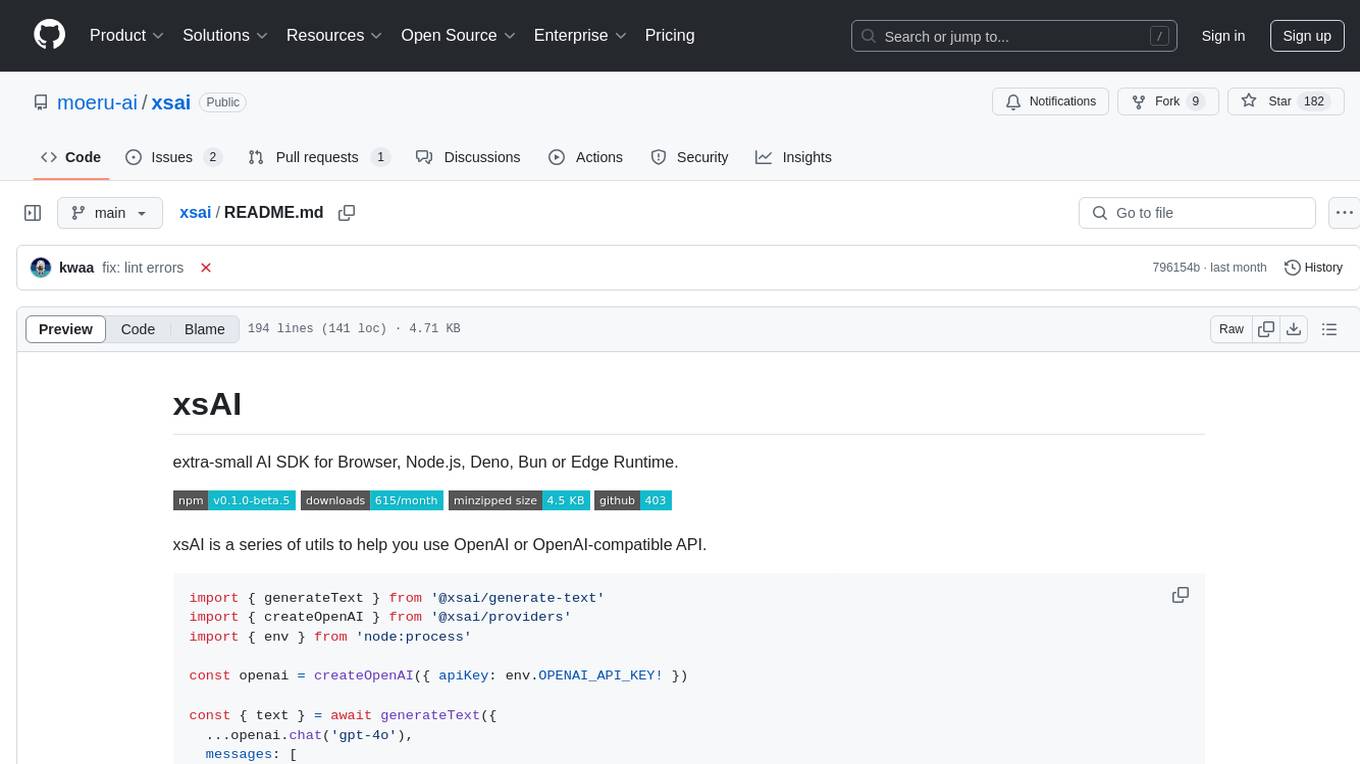
xsai
xsAI is an extra-small AI SDK designed for Browser, Node.js, Deno, Bun, or Edge Runtime. It provides a series of utils to help users utilize OpenAI or OpenAI-compatible APIs. The SDK is lightweight and efficient, using a variety of methods to minimize its size. It is runtime-agnostic, working seamlessly across different environments without depending on Node.js Built-in Modules. Users can easily install specific utils like generateText or streamText, and leverage tools like weather to perform tasks such as getting the weather in a location.

lollms
LoLLMs Server is a text generation server based on large language models. It provides a Flask-based API for generating text using various pre-trained language models. This server is designed to be easy to install and use, allowing developers to integrate powerful text generation capabilities into their applications.
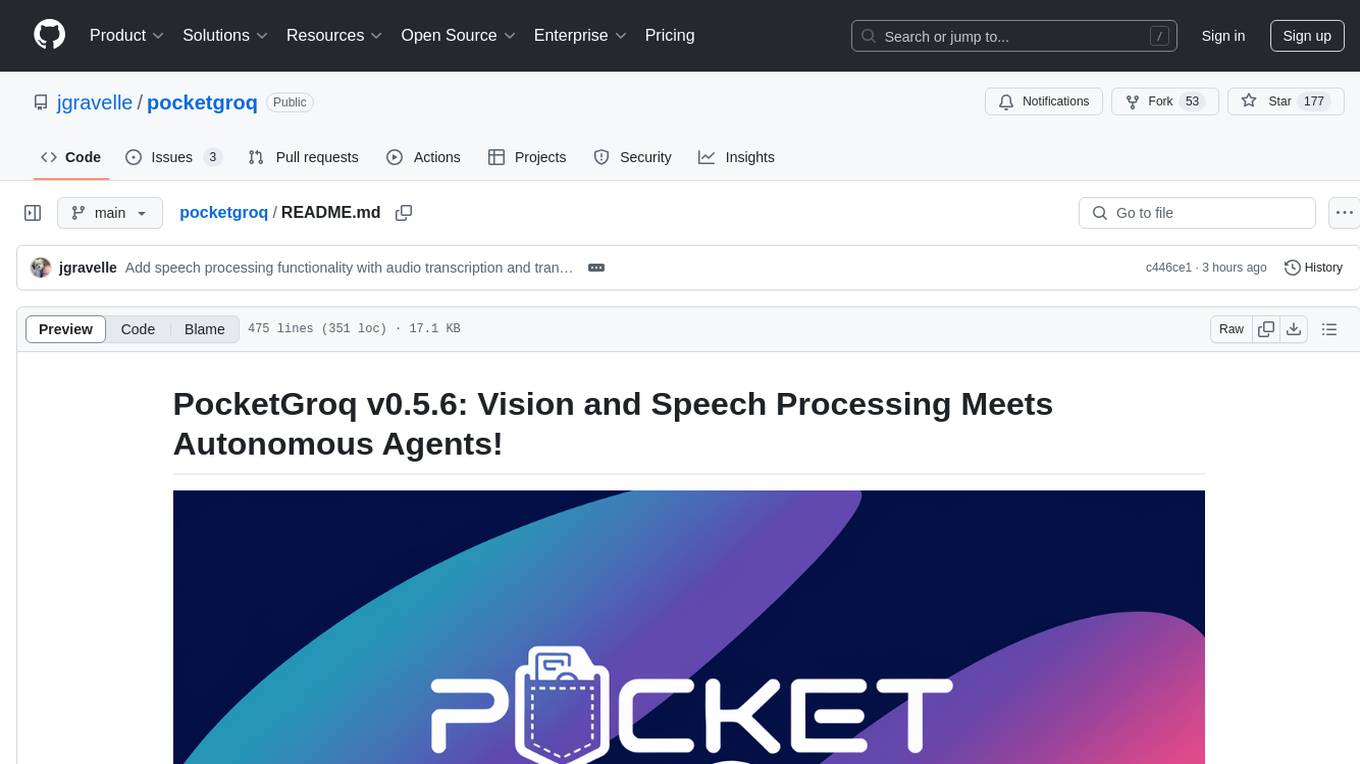
pocketgroq
PocketGroq is a tool that provides advanced functionalities for text generation, web scraping, web search, and AI response evaluation. It includes features like an Autonomous Agent for answering questions, web crawling and scraping capabilities, enhanced web search functionality, and flexible integration with Ollama server. Users can customize the agent's behavior, evaluate responses using AI, and utilize various methods for text generation, conversation management, and Chain of Thought reasoning. The tool offers comprehensive methods for different tasks, such as initializing RAG, error handling, and tool management. PocketGroq is designed to enhance development processes and enable the creation of AI-powered applications with ease.
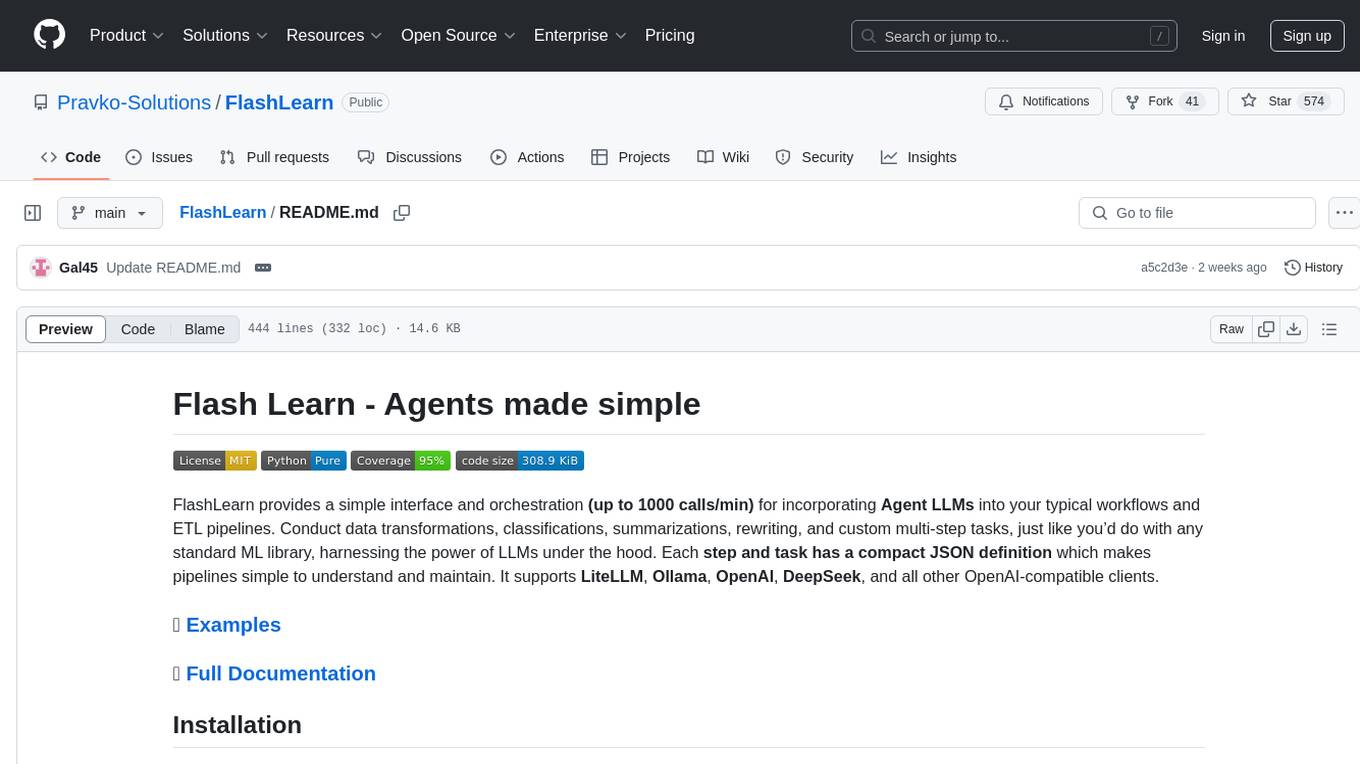
FlashLearn
FlashLearn is a tool that provides a simple interface and orchestration for incorporating Agent LLMs into workflows and ETL pipelines. It allows data transformations, classifications, summarizations, rewriting, and custom multi-step tasks using LLMs. Each step and task has a compact JSON definition, making pipelines easy to understand and maintain. FlashLearn supports LiteLLM, Ollama, OpenAI, DeepSeek, and other OpenAI-compatible clients.
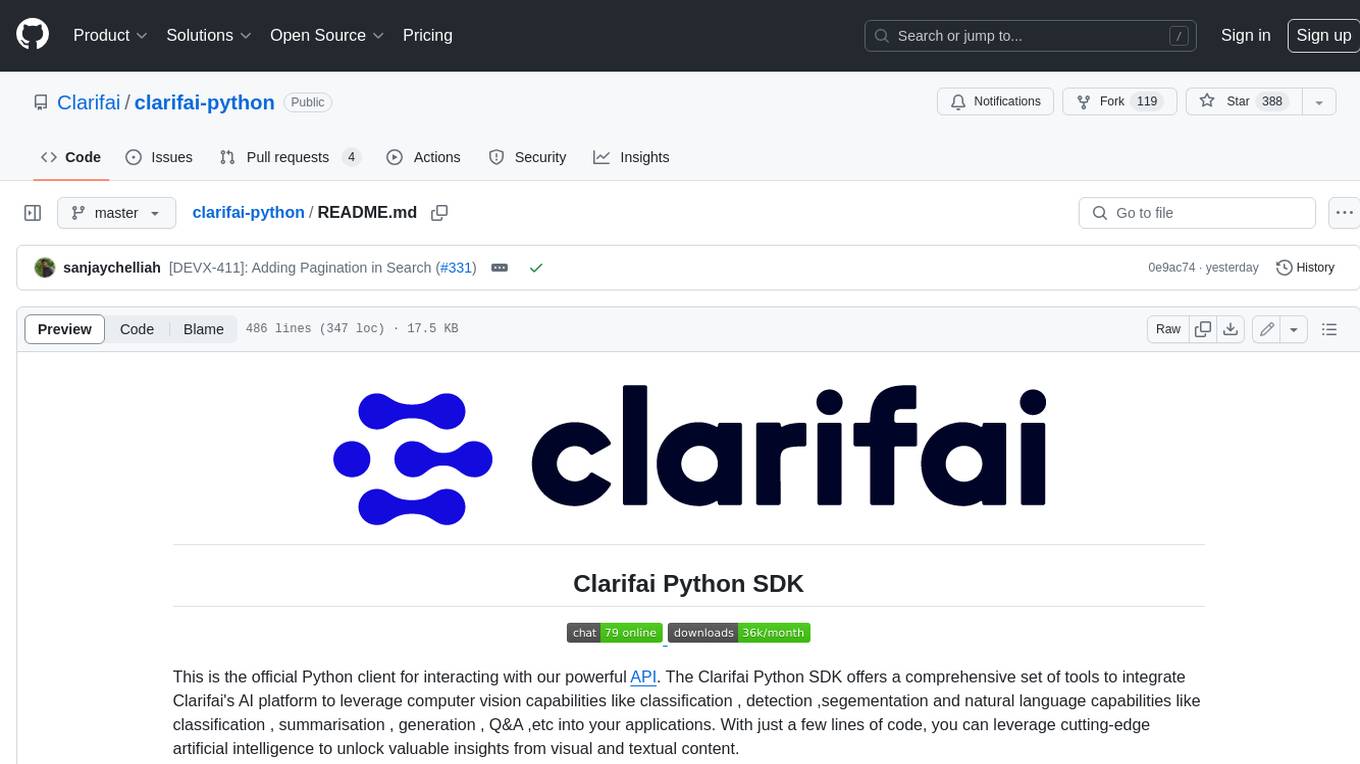
clarifai-python
The Clarifai Python SDK offers a comprehensive set of tools to integrate Clarifai's AI platform to leverage computer vision capabilities like classification , detection ,segementation and natural language capabilities like classification , summarisation , generation , Q&A ,etc into your applications. With just a few lines of code, you can leverage cutting-edge artificial intelligence to unlock valuable insights from visual and textual content.
For similar tasks

amadeus-python
Amadeus Python SDK provides a rich set of APIs for the travel industry. It allows users to make API calls for various travel-related tasks such as flight offers search, hotel bookings, trip purpose prediction, flight delay prediction, airport on-time performance, travel recommendations, and more. The SDK conveniently maps API paths to similar paths, making it easy to interact with the Amadeus APIs. Users can initialize the client with their API key and secret, make API calls, handle responses, and enable logging for debugging purposes. The SDK documentation includes detailed information about each SDK method, arguments, and return types.
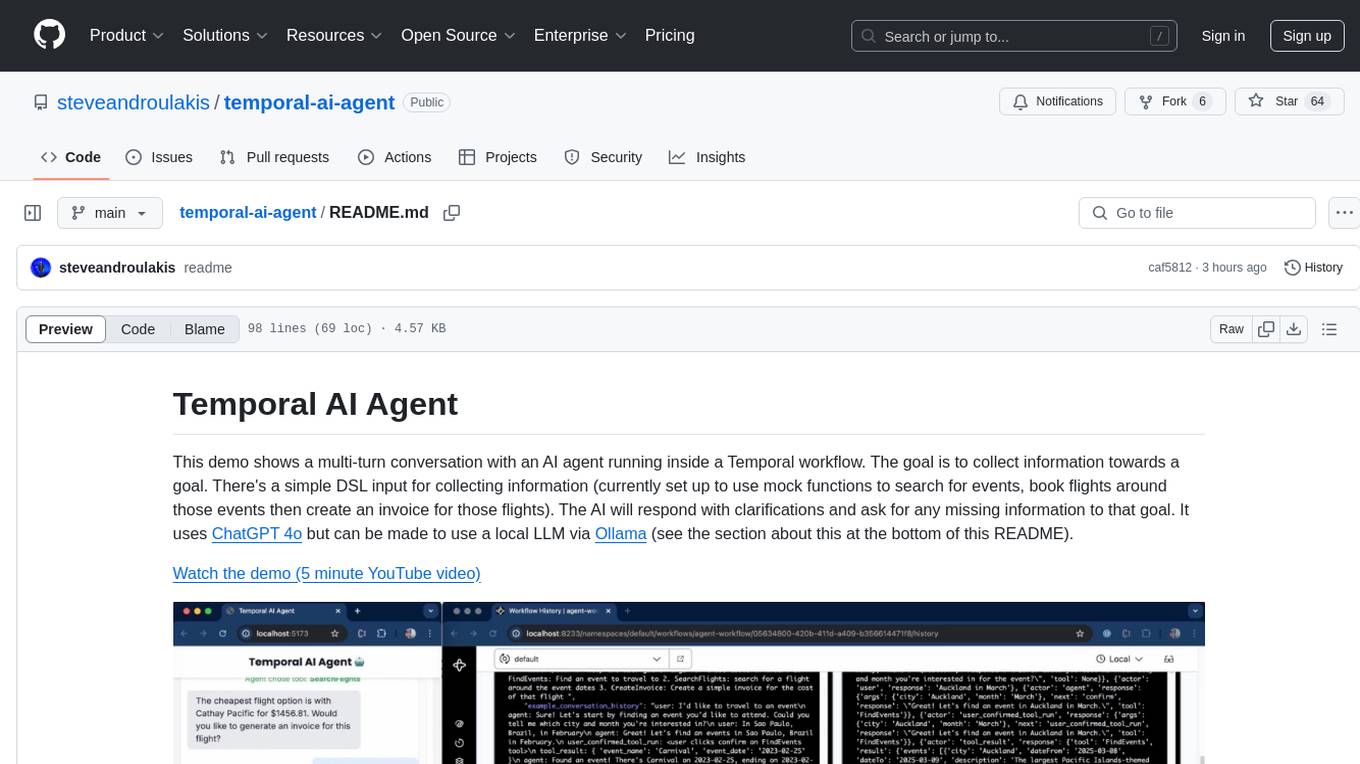
temporal-ai-agent
Temporal AI Agent is a demo showcasing a multi-turn conversation with an AI agent running inside a Temporal workflow. The agent collects information towards a goal using a simple DSL input. It is currently set up to search for events, book flights around those events, and create an invoice for those flights. The AI agent responds with clarifications and prompts for missing information. Users can configure the agent to use ChatGPT 4o or a local LLM via Ollama. The tool requires Rapidapi key for sky-scrapper to find flights and a Stripe key for creating invoices. Users can customize the agent by modifying tool and goal definitions in the codebase.
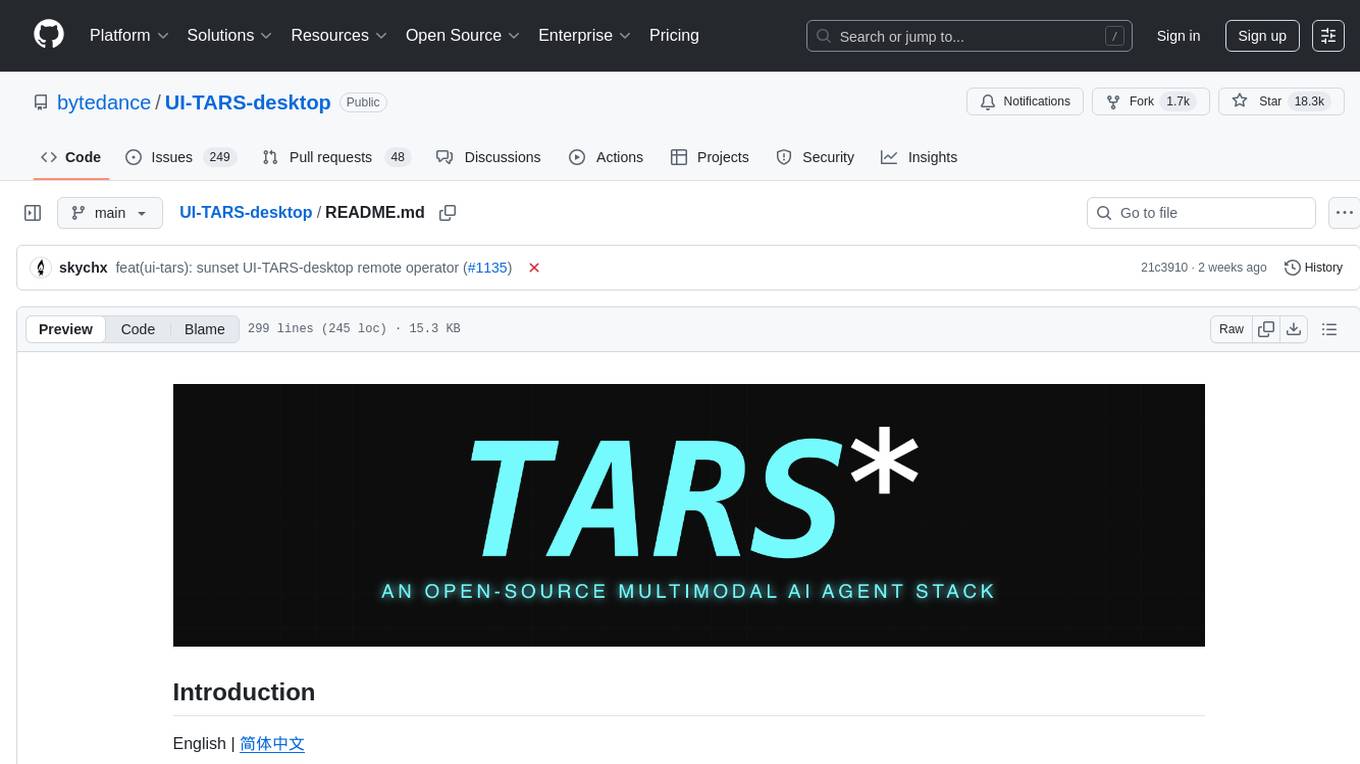
UI-TARS-desktop
UI-TARS-desktop is a desktop application that provides a native GUI Agent based on the UI-TARS model. It offers features such as natural language control powered by Vision-Language Model, screenshot and visual recognition support, precise mouse and keyboard control, cross-platform support (Windows/MacOS/Browser), real-time feedback and status display, and private and secure fully local processing. The application aims to enhance the user's computer experience, introduce new browser operation features, and support the advanced UI-TARS-1.5 model for improved performance and precise control.
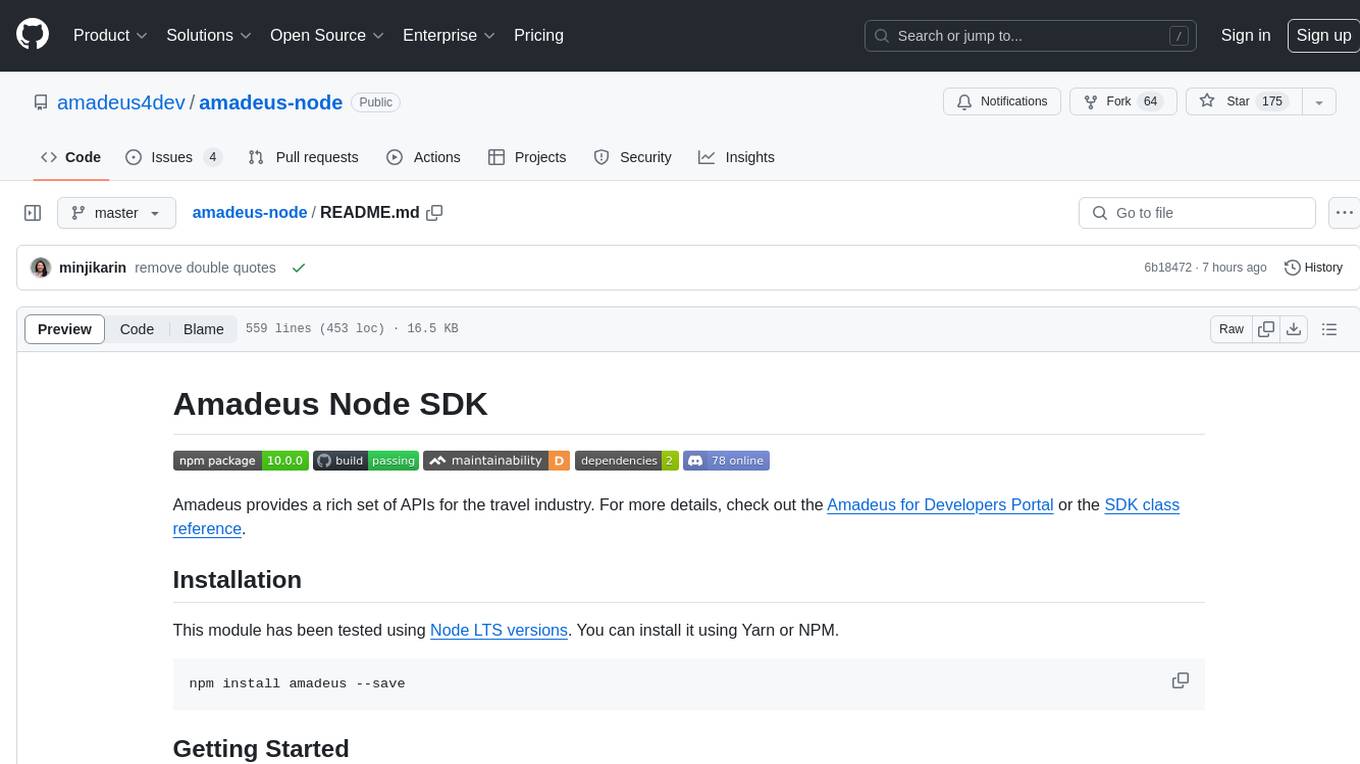
amadeus-node
Amadeus Node SDK provides a rich set of APIs for the travel industry. It allows developers to interact with various endpoints related to flights, hotels, activities, and more. The SDK simplifies making API calls, handling promises, pagination, logging, and debugging. It supports a wide range of functionalities such as flight search, booking, seat maps, flight status, points of interest, hotel search, sentiment analysis, trip predictions, and more. Developers can easily integrate the SDK into their Node.js applications to access Amadeus APIs and build travel-related applications.
For similar jobs

amadeus-python
Amadeus Python SDK provides a rich set of APIs for the travel industry. It allows users to make API calls for various travel-related tasks such as flight offers search, hotel bookings, trip purpose prediction, flight delay prediction, airport on-time performance, travel recommendations, and more. The SDK conveniently maps API paths to similar paths, making it easy to interact with the Amadeus APIs. Users can initialize the client with their API key and secret, make API calls, handle responses, and enable logging for debugging purposes. The SDK documentation includes detailed information about each SDK method, arguments, and return types.
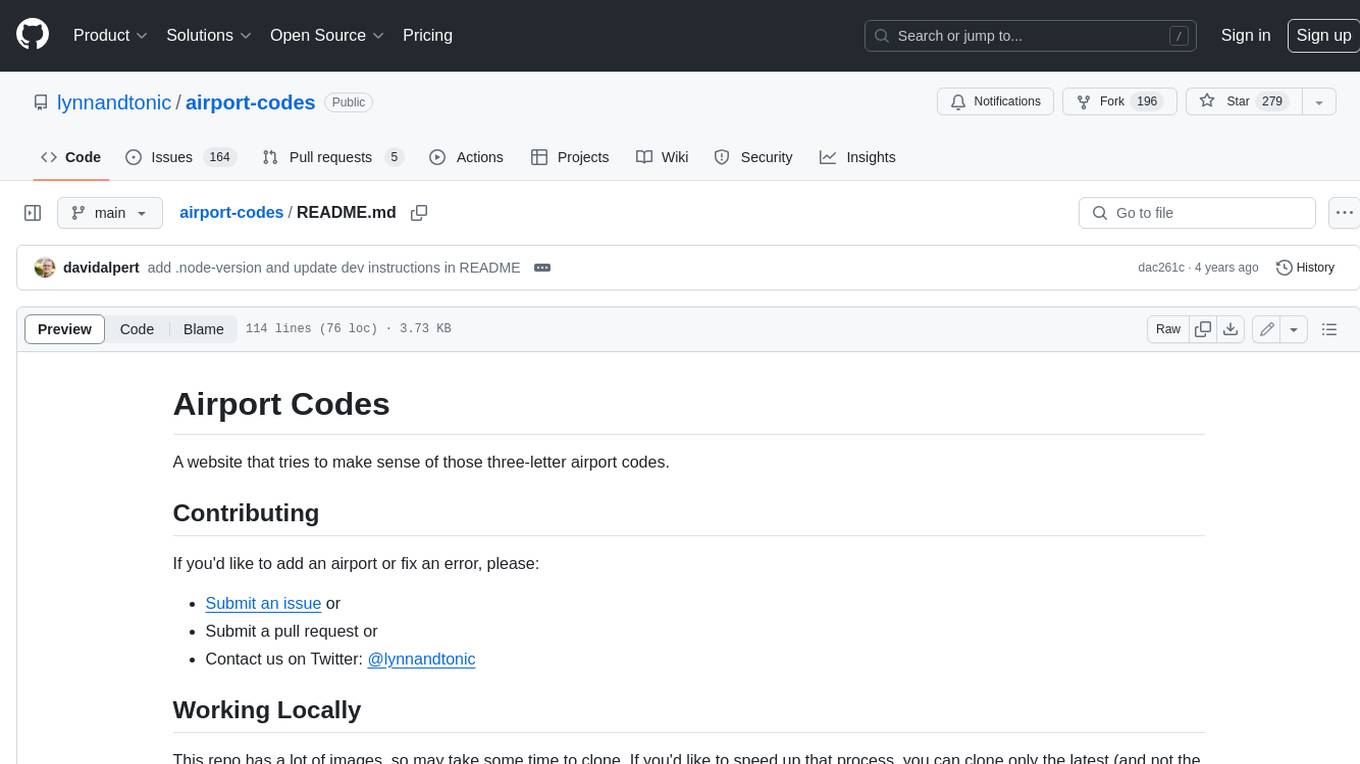
airport-codes
A website that tries to make sense of those three-letter airport codes. It provides detailed information about each airport, including its name, location, and a description. The site also includes a search function that allows users to find airports by name, city, or country. Airport content can be found in `/data` in individual files. Use the three-letter airport code as the filename (e.g. `phx.json`). Content in each `json` file: `id` = three-letter code (e.g. phx), `name` = airport name (Sky Harbor International Airport), `city` = primary city name (Phoenix), `state` = state name, if applicable (Arizona), `stateShort` = state abbreviation, if applicable (AZ), `country` = country name (USA), `description` = description, accepts markdown, use * for emphasis on letters, `imageCredit` = name of photographer, `imageCreditLink` = URL of photographer's Flickr page. You can also optionally add for aid in searching: `city2` = another city or country the airport may be known for. Adding a `json` file to `/data` will automatically render it. You do not need to manually add the path anywhere.
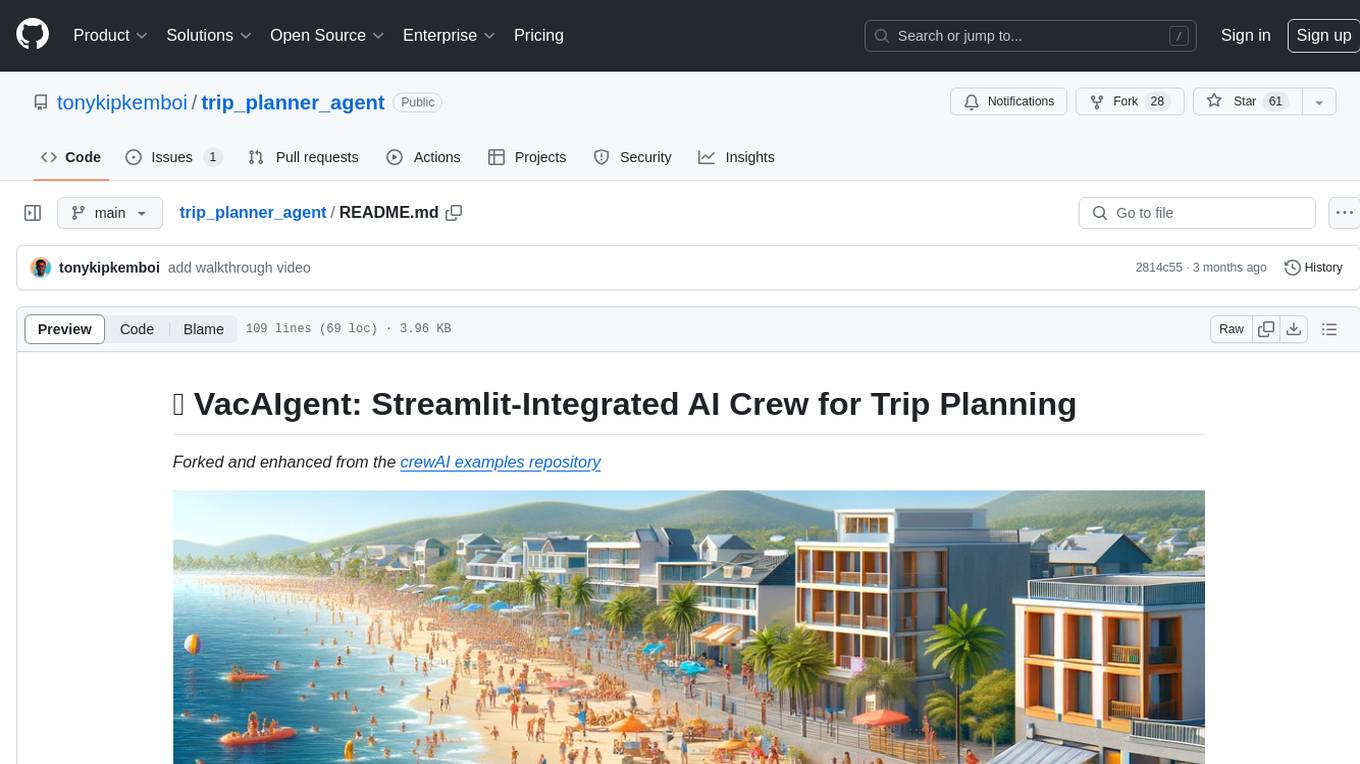
trip_planner_agent
VacAIgent is an AI tool that automates and enhances trip planning by leveraging the CrewAI framework. It integrates a user-friendly Streamlit interface for interactive travel planning. Users can input preferences and receive tailored travel plans with the help of autonomous AI agents. The tool allows for collaborative decision-making on cities and crafting complete itineraries based on specified preferences, all accessible via a streamlined Streamlit user interface. VacAIgent can be customized to use different AI models like GPT-3.5 or local models like Ollama for enhanced privacy and customization.

amadeus-node
Amadeus Node SDK provides a rich set of APIs for the travel industry. It allows developers to interact with various endpoints related to flights, hotels, activities, and more. The SDK simplifies making API calls, handling promises, pagination, logging, and debugging. It supports a wide range of functionalities such as flight search, booking, seat maps, flight status, points of interest, hotel search, sentiment analysis, trip predictions, and more. Developers can easily integrate the SDK into their Node.js applications to access Amadeus APIs and build travel-related applications.
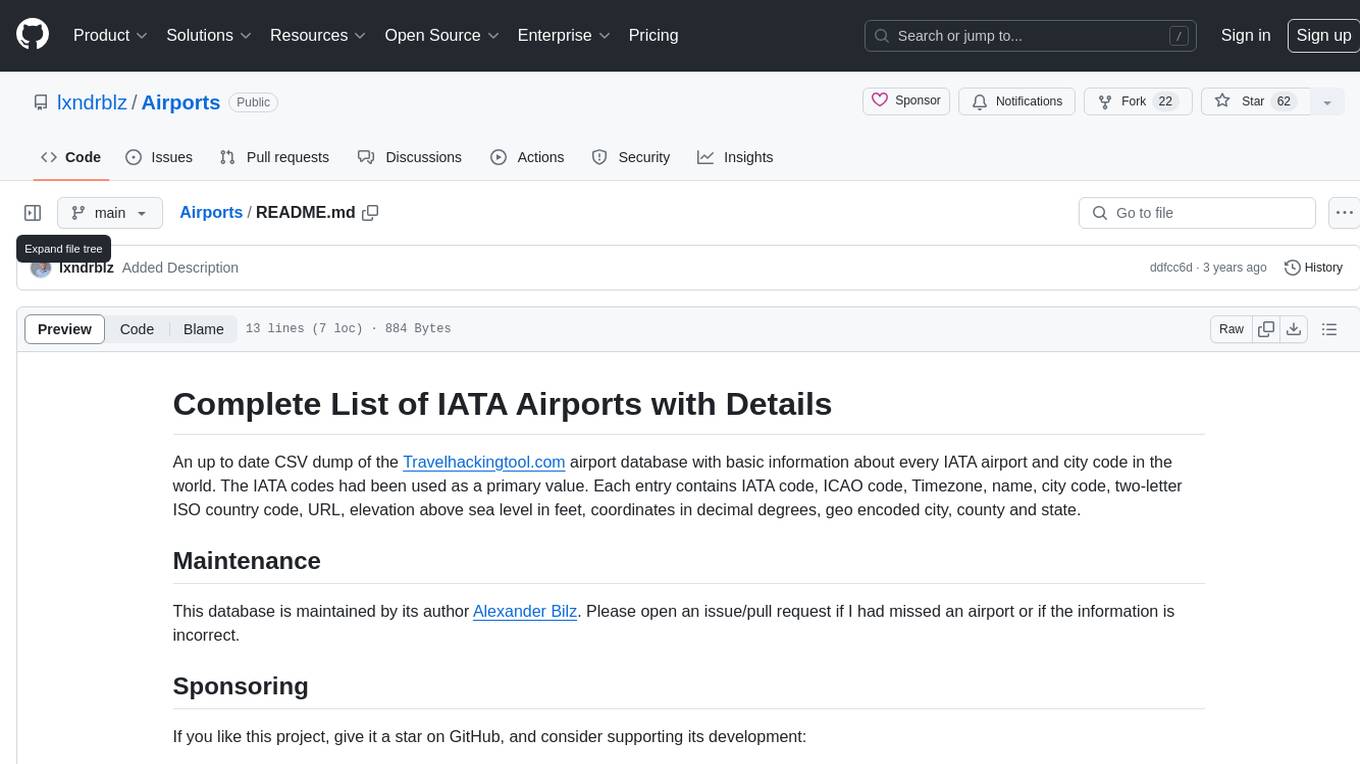
Airports
Airports is a repository containing an up-to-date CSV dump of the Travelhackingtool.com airport database. It provides basic information about every IATA airport and city code worldwide, including IATA code, ICAO code, timezone, name, city code, country code, URL, elevation, coordinates, and geo-encoded city, county, and state.
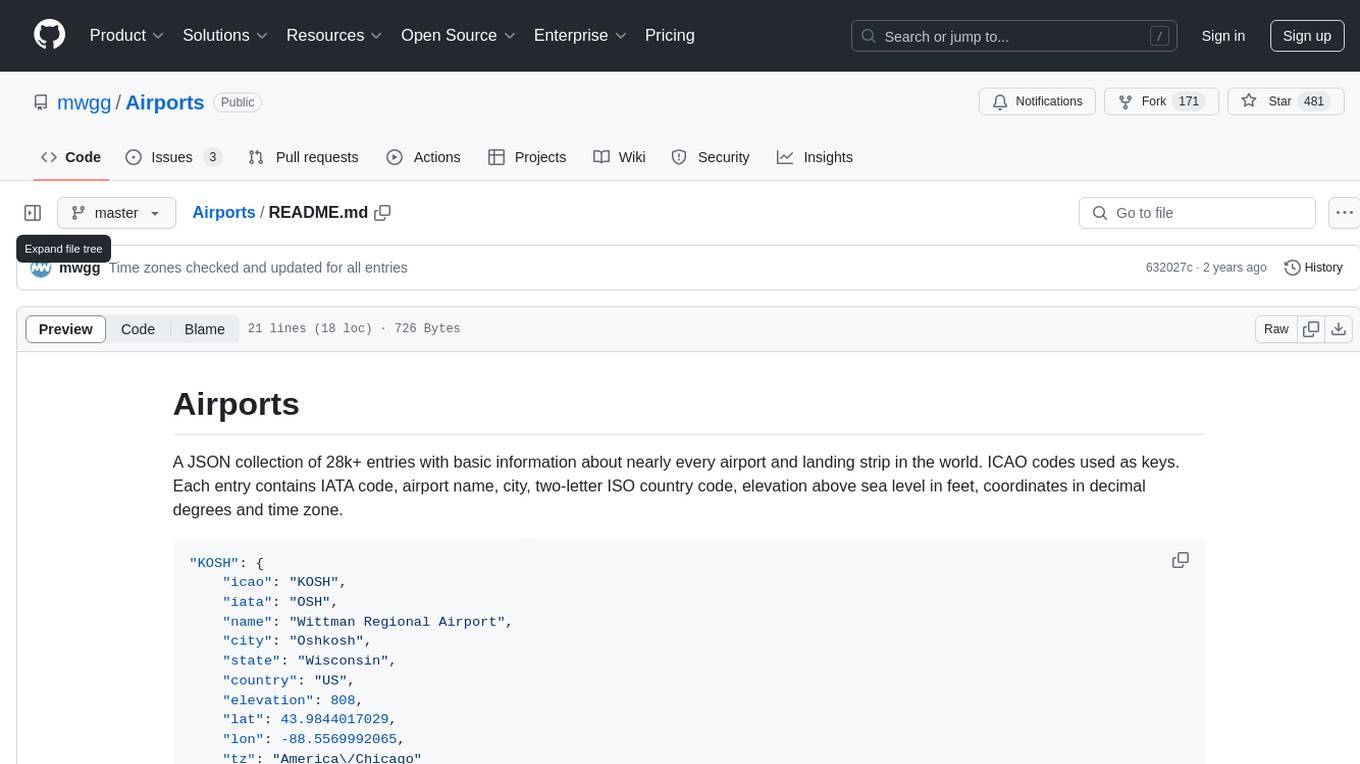
Airports
Airports is a JSON collection with detailed information about over 28,000 airports and landing strips worldwide. Each entry includes IATA code, airport name, city, country code, elevation, coordinates, and time zone.
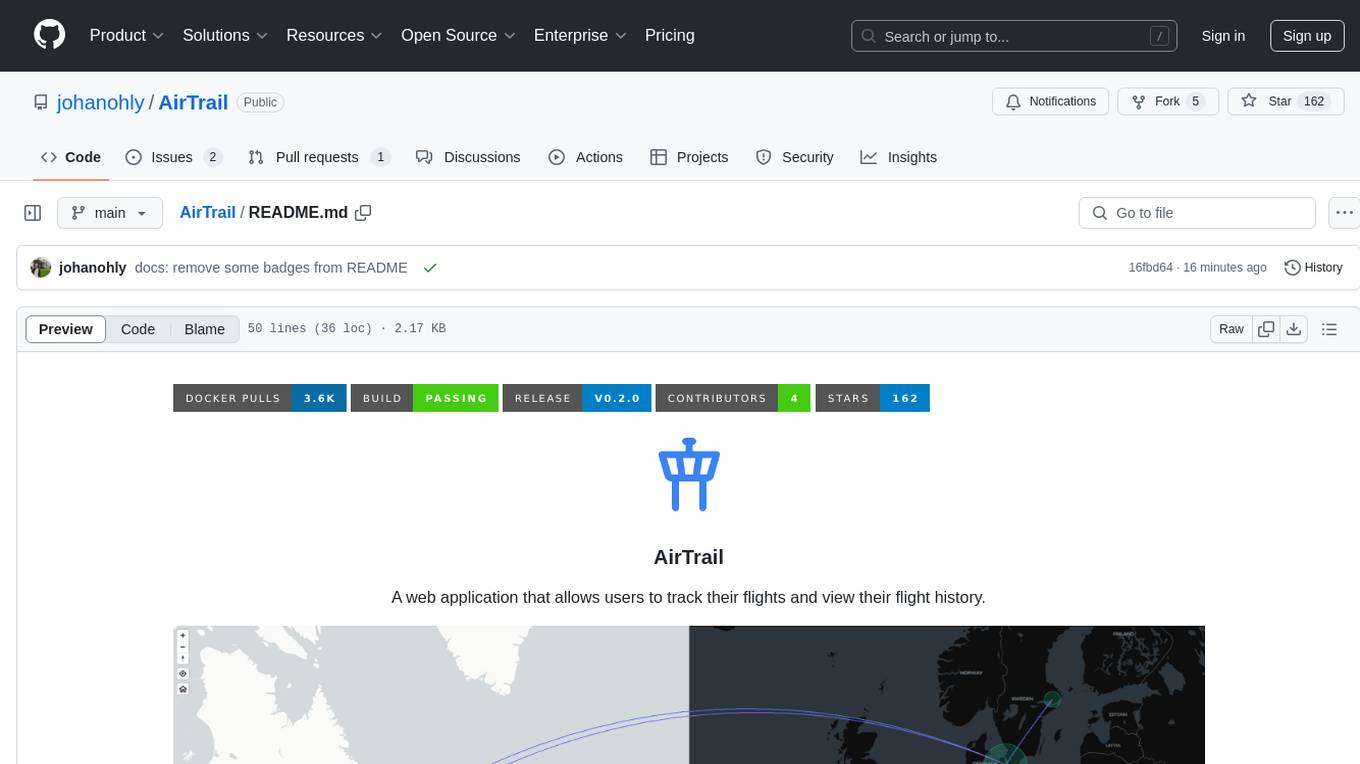
AirTrail
AirTrail is a web application that allows users to track their flights and view their flight history. It features an interactive world map to view flights, flight history tracking, statistics insights, multiple user management with user authentication, responsive design, dark mode, and flight import from various sources.
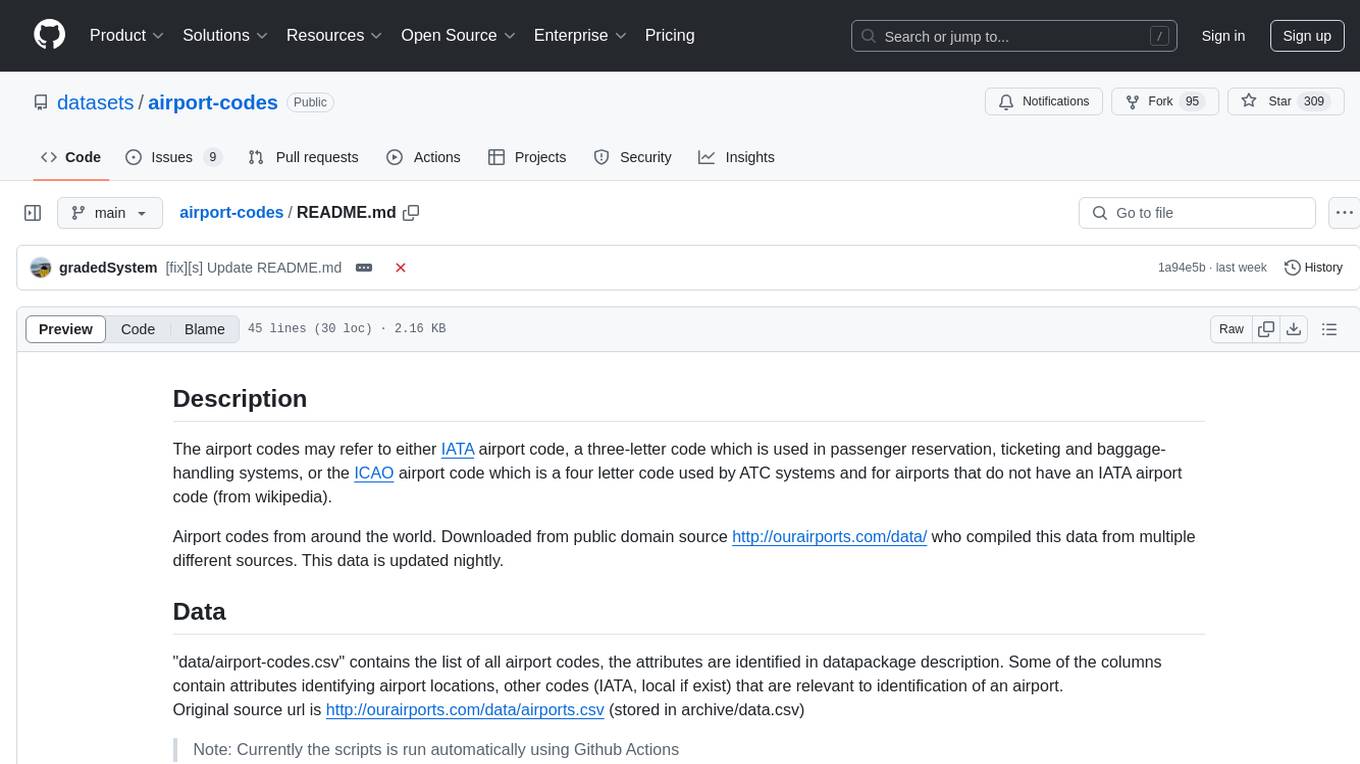
airport-codes
The airport-codes repository contains a list of airport codes from around the world, including IATA and ICAO codes. The data is sourced from multiple different sources and is updated nightly. The repository provides a script to process the data and merge location coordinates. The data can be used for various purposes such as passenger reservation, ticketing, and ATC systems.